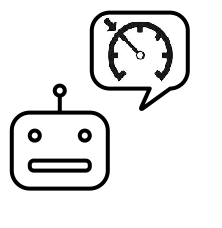What can a bilingual chatbot learn from a cruise-control mechanism?
Netzer Bar Am# and Shuly Wintner - Department of Computer Science
Machine Learning
Deep learning
Neural Networks
Robotics
PhD Grant 2021

People who speak more than one language (e.g., immigrants or members of language minority communities) tend to interleave these languages when they communicate with people who share a similar background. This phenomenon is known among researchers as Code-Switching. Code-switching is not produced arbitrarily; though typically unconscious, it conveys rapport and naturally arouses trust. On the other hand, un-natural code-switching might do the opposite. Our main goal in this work is to develop computational conversational agents (chatbots) that can produce code-switched language in a manner that sounds natural to bilingual users.
The innovative part of our work emerges from the concept of feedback. Numerous technological devices (e.g., cruise control, robotic arms, temperature controlled ovens, autopilots, etc.) are designed to reach and keep some desired physical value (e.g., the car speed) despite the action of external factors. The rapid measurement of such values is tightly connected to a smart decision regarding the next action (e.g., the selection of the appropriate fuel injection rate of the car).
In our research we treat human-machine dialogues as feedback systems. Each side reacts to its interlocutor by adjusting the properties of its speech in the next turn. We will apply well known tools from the field of Control Engineering in order to adjust the nature of code-switching of the chatbot to that of the human user.
In our work, the human user shall play a collaborative game with a chatbot. The experimental work will be done with English-Spanish speakers from America. We will explore some code-switching strategies for the chatbot, and evaluate their influence on the human user.
Comprehension and generation of code-switching in a way that is natural to humans is a great challenge for computers. Along the research we shall tackle those challenges with contemporary technology. In addition, we shall integrate them under the concept of feedback for adjusting the required amount of code-switching.
Our work is aimed towards revealing some fundamental properties of code-switching in written dialogues. The application of the concept of feedback to a bilingual chatbot is expected to pave the way for smart control of other text properties in order to achieve more engaging and sincere human-machine dialogues.
* Netzer Bar Am is a Ph.D. Student of Computational Linguistics at the University of Haifa
** Shuly Wintner is a professor of Computer Science at the University of Haifa

People who speak more than one language (e.g., immigrants or members of language minority communities) tend to interleave these languages when they communicate with people who share a similar background. This phenomenon is known among researchers as Code-Switching. Code-switching is not produced arbitrarily; though typically unconscious, it conveys rapport and naturally arouses trust. On the other hand, un-natural code-switching might do the opposite. Our main goal in this work is to develop computational conversational agents (chatbots) that can produce code-switched language in a manner that sounds natural to bilingual users.
The innovative part of our work emerges from the concept of feedback. Numerous technological devices (e.g., cruise control, robotic arms, temperature controlled ovens, autopilots, etc.) are designed to reach and keep some desired physical value (e.g., the car speed) despite the action of external factors. The rapid measurement of such values is tightly connected to a smart decision regarding the next action (e.g., the selection of the appropriate fuel injection rate of the car).
In our research we treat human-machine dialogues as feedback systems. Each side reacts to its interlocutor by adjusting the properties of its speech in the next turn. We will apply well known tools from the field of Control Engineering in order to adjust the nature of code-switching of the chatbot to that of the human user.
In our work, the human user shall play a collaborative game with a chatbot. The experimental work will be done with English-Spanish speakers from America. We will explore some code-switching strategies for the chatbot, and evaluate their influence on the human user.
Comprehension and generation of code-switching in a way that is natural to humans is a great challenge for computers. Along the research we shall tackle those challenges with contemporary technology. In addition, we shall integrate them under the concept of feedback for adjusting the required amount of code-switching.
Our work is aimed towards revealing some fundamental properties of code-switching in written dialogues. The application of the concept of feedback to a bilingual chatbot is expected to pave the way for smart control of other text properties in order to achieve more engaging and sincere human-machine dialogues.
* Netzer Bar Am is a Ph.D. Student of Computational Linguistics at the University of Haifa
** Shuly Wintner is a professor of Computer Science at the University of Haifa

